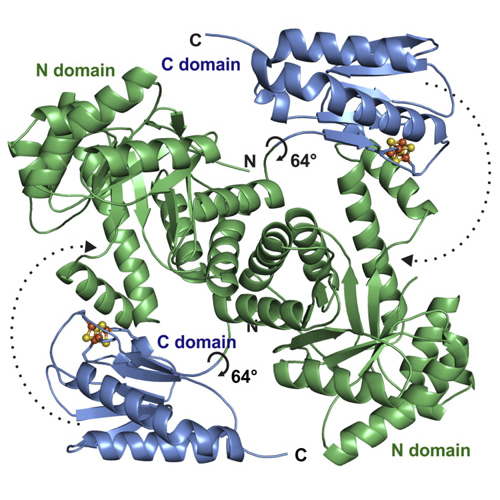Atomic-Resolution Structures of Discrete Stages on the Reaction Coordinate of the [Fe4S4] Enzyme IspG (GcpE)
19-Jun-2015
Journal of Molecular Biology, 2015, doi:10.1016/j.jmb.2015.04.002, Volume 427, Issue 12, Pages 2220–2228 published on 19.06.2015
Journal of Molecular Biology, online article
Journal of Molecular Biology, online article
IspG is the penultimate enzyme in non-mevalonate biosynthesis of the universal terpene building blocks isopentenyl diphosphate and dimethylallyl diphosphate. Its mechanism of action has been the subject of numerous studies but remained unresolved due to difficulties in identifying distinct reaction intermediates. Using a moderate reducing agent and an epoxide substrate analogue, we were now able to trap and crystallographically characterize various stages in the IspG-catalyzed conversion of 2-C-methyl-d-erythritol-2,4-cyclo-diphosphate into (E)-1-hydroxy-2-methylbut-2-enyl-4-diphosphate. In addition, the enzyme's structure was determined in complex with several inhibitors. These results, combined with recent electron paramagnetic resonance data, allowed us to deduce a detailed and complete IspG catalytic mechanism, which describes all stages from initial ring opening to formation of (E)-1-hydroxy-2-methylbut-2-enyl-4-diphosphate via discrete radical and carbanion intermediates. The data presented in this article provide a guide for the design of selective drugs against many prokaryotic and eukaryotic pathogens to which the non-mevalonate pathway is essential for survival and virulence.











